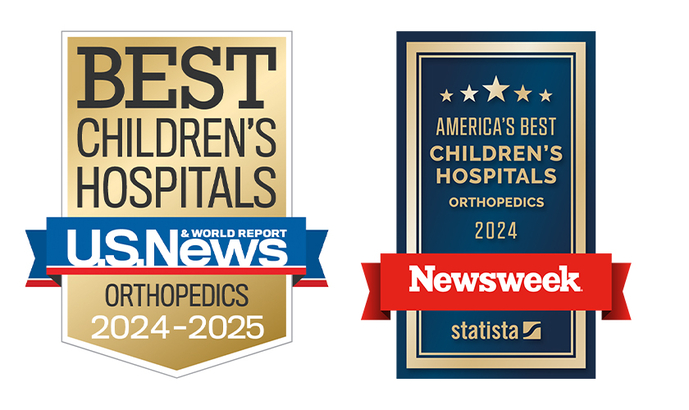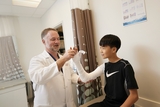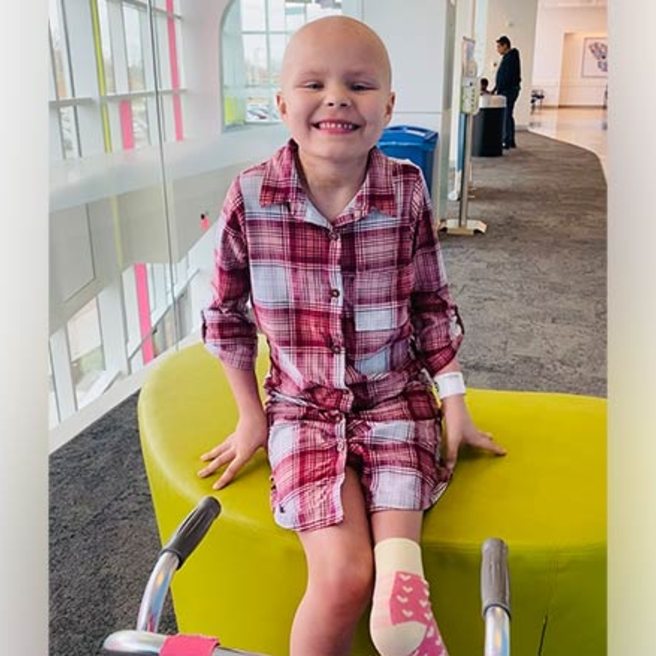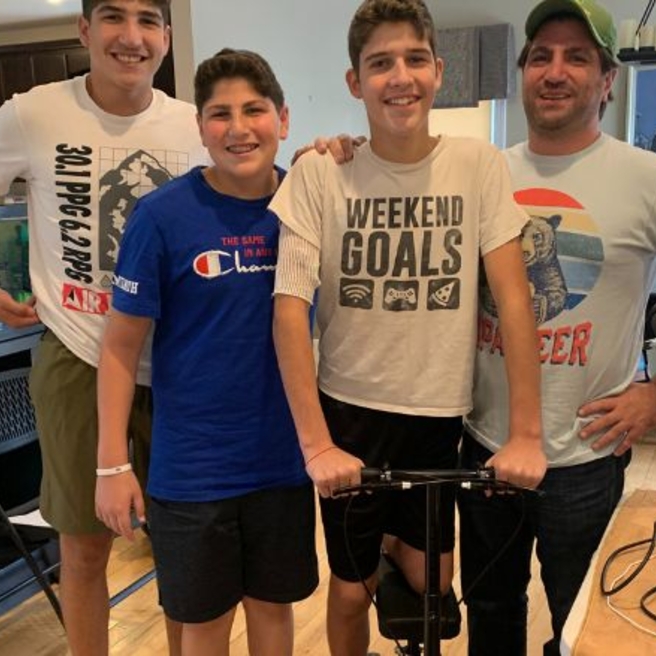Orthopedic Center


CHOP's Orthopedic Center treats children, teens and young adults with conditions that affect their bones, joints, muscles and tendons. We are recognized worldwide for our outstanding patient outcomes and family-centered care. Our center again earned the No. 1 ranking in the nation for orthopedics, sports medicine and bone health in U.S. News & World Report’s 2024-2025 Honor Roll of Best Children’s Hospitals. We are also ranked among the best pediatric orthopedics programs in the nation by Newsweek.
When injury or illness keeps a child from exploring their world, pediatric orthopedic surgeons and doctors at Children's Hospital of Philadelphia (CHOP) can help. Broken bones are fixed so kids can get back on the playground. Ribcages are expanded so it's easier to breathe. Athletes are taught to train safely, reducing the risk of injury. Limbs and joints are repaired so walking, running and throwing are possible.
How we serve you
For every condition or injury affecting a child’s bones, joints, muscles or tendons, there is an expert team at Children’s Hospital of Philadelphia that will work collaboratively to get your child the best possible outcome.
-
Bone and Soft Tissue Tumor Program -
Brachial Plexus Injury Program -
Center for Thoracic Insufficiency Syndrome -
Cerebral Palsy Program -
Dance medicine -
Foot and Ankle Program -
Hand and Arm Disorders Program -
Hip Disorders Program -
Limb Preservation and Reconstruction Program -
Neuromuscular Program -
Occupational Therapy Services -
Orthopedic Trauma Program -
Physical Therapy Department -
Spine Program -
Sports Medicine and Performance Center -
Throwing Medicine -
Young Adult Hip Preservation Program
Conditions we treat
We treat children with all types of orthopedic conditions that affect their bones, joints, muscles and tendons, including those listed below.
-
Acetabular dysplasia -
ACL injuries -
Aneurysmal bone cyst -
Anterior knee pain -
Avascular necrosis -
Back pain -
Beckwith-Wiedemann syndrome -
Bone metastasis -
Brachial plexus and peripheral nerve injuries -
Broken forearm -
C1 atlas spine injury -
C2 axis spine injury -
Calcaneovalgus foot -
Camptodactyly -
Cavus foot -
Cerebral palsy foot disorders -
Cerebral palsy gait disorders -
Cerebral palsy hip disorders -
Cerebral palsy spinal disorders -
Chondroblastoma -
Chondromyxoid fibroma -
Chondrosarcoma -
Clinodactyly -
Congenital muscular torticollis -
Congenital scoliosis -
Congenital short femur -
Congenital vertical talus -
Desmoid tumors -
Developmental dysplasia of the hip (DDH) -
Diastrophic dysplasia -
Early-onset scoliosis -
Enchondroma -
Ewing sarcoma -
Femoral anteversion -
FHL tendonitis -
Fibrous dysplasia -
Flat feet -
Foot, ankle and toe conditions -
Genetic cervical spine conditions -
Giant cell tumor of bone -
Goldenhar syndrome -
Growth plate injuries -
Hand fracture -
Hip cartilage tear (labral tear) -
Hip impingement -
Idiopathic scoliosis -
Infantile scoliosis -
Jeune syndrome -
Klippel-Feil syndrome -
Kniest dysplasia -
Kyphosis -
Langerhans cell histiocytosis -
Larsen syndrome -
Legg-Calve-Perthes disease -
Limb-length discrepancy -
Lordosis -
Lower cervical spine injuries -
Macrodactyly -
Meniscus tear (knee injuries) -
Morquio syndrome -
Muscular dystrophy -
Neuromuscular scoliosis -
Nonossifying fibroma -
Nursemaid's elbow -
Os trigonum syndrome -
Osgood-Schlatter disease -
Osteoblastoma -
Osteochondritis dissecans -
Osteochondroma -
Osteogenesis imperfecta -
Osteoid osteoma -
Osteosarcoma (bone cancer in children) -
Periosteal chondroma -
Proximal femoral focal deficiency -
Pseudoachondroplasia -
Rhabdomyosarcoma -
Rib deformities -
Sequelae (consequence) of pediatric hip disease -
Sever's disease -
Slipped capital femoral epiphysis -
Snapping hip syndrome -
Soft tissue sarcomas -
Spasticity -
Spina bifida -
Spinal deformities -
Spinal muscular atrophy -
Spondyloepiphyseal dysplasia congenita -
Sprained ankle -
Stress fractures -
Symbrachydactyly -
Syndactyly -
Tarsal coalition -
Thoracic insufficiency syndrome -
Thoracic, lumbar and sacral spine injuries -
Thumb duplication -
Thumb hypoplasia -
Tibial torsion -
Trauma-related spine conditions -
Trigger finger and trigger thumb -
Unicameral bone cyst -
Wrist fracture

Why choose us for orthopedics
Our pioneering surgeons and multidisciplinary team are ready to treat any orthopedic condition your child may face.

Meet your team
Our team of world-renowned orthopedic surgeons, sports medicine physicians, nurse practitioners, physician assistants, nurses, therapists, athletic trainers and others work together to provide complete and individualized care for your child.

Our locations
Our pediatric orthopedic specialists provide care at many CHOP Care Network locations located throughout the region. Find the best possible care for your child, close to home.

Our research
We are dedicated to using what we learn through research – both in the laboratory and at the bedside – to improve the treatment options available for children and teens with all types of orthopedic conditions, now and for years to come.

Resources for families
We have created resources to help you find answers to your questions and feel more confident in the care you are providing your child.

Resources for professionals
Everything you need to support your patient’s health, created and updated by our CHOP community of experts.
About your child’s orthopedic appointment
Learn what to expect at your orthopedic visit, including what to bring with you, what to expect before, during and after your child's exam, and more.
Safety in surgery
Our orthopedic surgeons always use the least invasive approach possible to repair a defect or injury and help your child recover as quickly as possible.

#1 in the Nation ... Again!
The 2024-25 ranking in U.S. News & World Report’s Honor Roll of Best Children’s Hospitals is a tribute to the world-class care, innovative treatment and cutting-edge research provided by CHOP's Ortho team.
Your donation changes lives
A gift of any size helps us make lifesaving breakthroughs for children everywhere.


